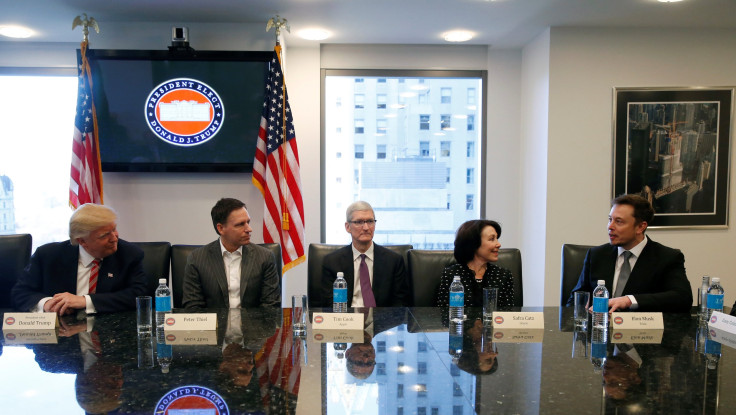Tech Heavyweights Won’t Help Build Donald Trump’s Muslim Registry

When President-elect Donald Trump met leaders from the tech industry Wednesday in a room at Trump Towers in Manhattan, he referred to a rise in the stock market and said: “So right now everybody in this room has to like me — at least a little bit.” Whether or not they actually like him, big tech companies are certainly not behind his proposed plan to build a registry to track Muslims in the United States.
Twitter CEO Jack Dorsey was conspicuously not invited to the meeting, which was held a day after the microblogging service said it would not help Trump build the registry. Other tech leaders who have previously had run-ins with Trump, however, attended the meeting. Among them was Apple’s Tim Cook who was criticized by Trump after Apple refused to unlock the iPhone of one of the San Bernardino, California, shooters. Amazon’s Jeff Bezos, who also owns the Washington Post, has spoken about wanting to send Trump to Mars and has been accused by the president-elect of directing negative coverage.
Numerous tech heavyweights, including Facebook, Microsoft, IBM, Uber, Google and Apple have issued statements saying they will not help the incoming administration build such a registry. In response to questions by BuzzFeed, most of those companies said they would not participate in such an effort, and that they hadn’t been asked to do so either.
Employees from various tech companies, including Google, IBM, Salesforce, Slack and Twitter, penned an open letter Tuesday opposing the proposed Muslim registry, and it currently has more than 2,100 signatories.
Without the support of technology companies, building the kind of surveillance system Trump and his advisers have proposed would be difficult, if not virtually impossible.
As on many other issues, Trump has had a conflicting and changing stance on the Muslim registry idea, sometimes supporting it but backing away at other times. Some other Republican leaders have not only spoken in favor of such a registry, but also urged the president-elect to create a surveillance program targeting Muslims.
Rep. Peter King, R-N.Y., encouraged Trump to create such a program during a meeting Thursday, and a few days after Trump’s Nov. 8 election victory, Carl Higbie, a former Navy Seal and spokesman for the Great America PAC that backed Trump’s presidential bid, told Fox News a Muslim registry would be constitutionally valid. He cited the internment of 120,000 Japanese Americans during World War II as legal precedent. Trump supporter and former New York Mayor Rudy Guiliani has also advocated for the idea.
The National Security Entry-Exit Registration System, which was started in the aftermath of the Sept. 11, 2001, attacks, was closed down in 2011 after concerns were raised it unfairly targeted Muslims. Kris Kobach, Kansas secretary of state, who helped design the system, also said a Muslim registry could be implemented.
Some survivors of the San Bernardino terror attack, however, say the registry is a bad idea based on fear, hate and ignorance.
© Copyright IBTimes 2025. All rights reserved.





















